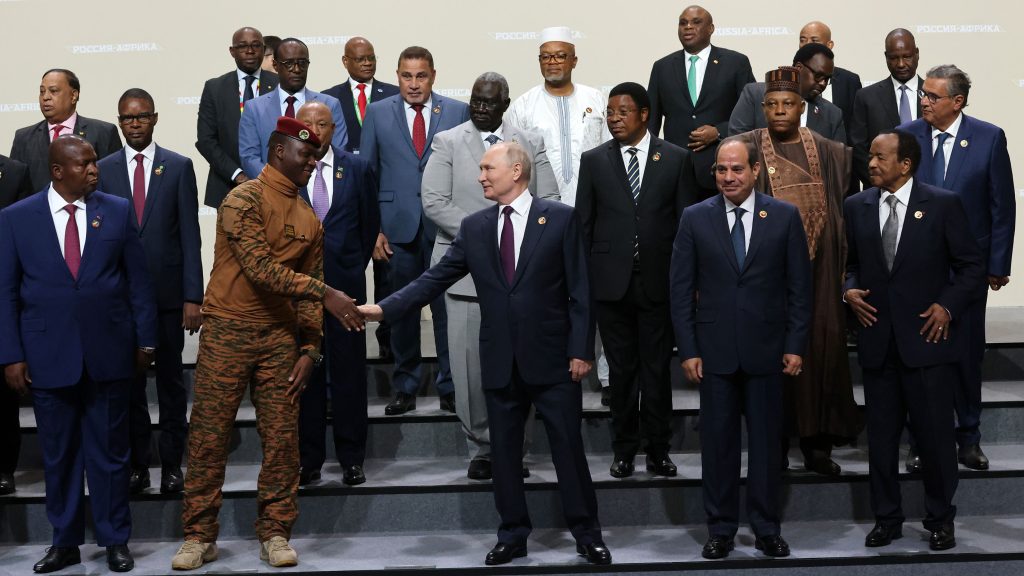Russia’s engagement with the African continent has witnessed a notable surge in recent years, leading to the establishment of a diplomatic and economic pact between the two entities. The Russia-Africa Summit 2023, held in July, was a pivotal moment that solidified this growing relationship. During the summit, Russia made a significant move by signing a joint declaration to foster a more just, balanced, and stable multipolar world order.
Moreover, the declaration highlighted Russia’s commitment to opposing international confrontation within the African continent and expressed its intention to alleviate the debt burden faced by African nations. This article delves into the implications of this pact, the motives behind Russia’s growing presence in Africa, and its potential impact on the continent’s socio-economic landscape.
The Russia-Africa Summit was a landmark event that brought together African leaders and Russian delegates to discuss mutual interest, cooperation, and development issues. The summit departed from Russia’s previous passive approach to Africa, signaling its intention to engage with the continent on multiple fronts actively. The joint declaration signed during the summit reflects Russia’s desire to foster a more balanced global order and promote cooperation rather than confrontation in Africa.
One of the key highlights of the joint declaration was Russia’s emphasis on a multipolar world order. In contrast to the unipolar world order, where a single dominant power holds significant influence, a multipolar world envisions a more diversified power distribution among multiple countries.
Strategic Plans & Russia’s Influence in Africa
By advocating for a multipolar world order, Russia seeks to counterbalance the effect of dominant Western powers and create a more equitable global playing field. This aligns with the aspirations of many African nations, which have historically felt marginalized and exploited by the global power dynamics.
Another noteworthy aspect of the joint declaration was Russia’s commitment to opposing all international confrontations in Africa. This stance is particularly relevant in various geopolitical tensions recently affecting the continent. Russia aims to contribute to a more stable and secure Africa by promoting peaceful conflict resolution and encouraging dialogue. This position resonates with the African Union’s efforts to achieve continental unity and resolve conflicts diplomatically.
Apart from diplomacy, the economic dimension is crucial to understanding Russia’s growing interest in Africa. The continent boasts vast, untapped natural resources, burgeoning markets, and immense growth potential. Russia’s increased involvement in Africa’s economic landscape aligns with its quest for diversifying trade and investment opportunities away from traditional partners.
A Win-Win Approach to a Success Russia-Africa Partnership
Russia’s strategic investments in Africa have been predominantly focused on the energy and mining sectors. In exchange for technology transfers and infrastructure development, Russia gains access to valuable resources that support its domestic industries. This win-win approach serves both parties’ interests, fostering sustainable economic growth and providing Africa with much-needed investments and expertise.
Furthermore, the joint declaration’s commitment to wiping out African debts is a significant gesture of goodwill from Russia. Many African countries have been grappling with heavy debt burdens that hinder their development prospects. By relieving this burden, Russia aims to strengthen its ties with African nations and enable them to pursue development projects more effectively.
The Russia-Africa Partnership has the potential to yield several positive outcomes for the African continent. Firstly, increased investments and technology transfers can boost Africa’s industrial and infrastructural capabilities, spurring economic growth and job creation. This, in turn, can help address poverty and enhance millions of Africans’ living standards.
Secondly, by promoting a multipolar world order, Africa gains more diplomatic leverage and options for cooperation. Rather than being beholden to the interests of a few dominant powers, African nations can explore partnerships with a diverse array of countries, maximizing their bargaining power in international forums.
Additionally, Russia’s opposition to international confrontation in Africa could contribute to conflict resolution and peacekeeping efforts. Russia has been involved in peacekeeping missions in various parts of the world, and its experience in this domain could be harnessed to support African initiatives for peace and security.
The Russia-Africa Partnership, exemplified by the joint declaration signed at the Russia-Africa Summit, represents a significant step in the evolving relationship between the two entities. The emphasis on a more just, balanced, and stable multipolar world order and the commitment to opposing international confrontation and alleviating Africa’s debt burden signifies Russia’s intention to be a strategic partner in Africa’s development journey.
While the impact of this pact remains to be seen, it holds the potential to bring about positive changes in Africa’s economic and diplomatic landscape. However, for the partnership to succeed genuinely, both parties must work towards mutual respect, transparency, and cooperation to ensure a sustainable and beneficial relationship for all involved.

